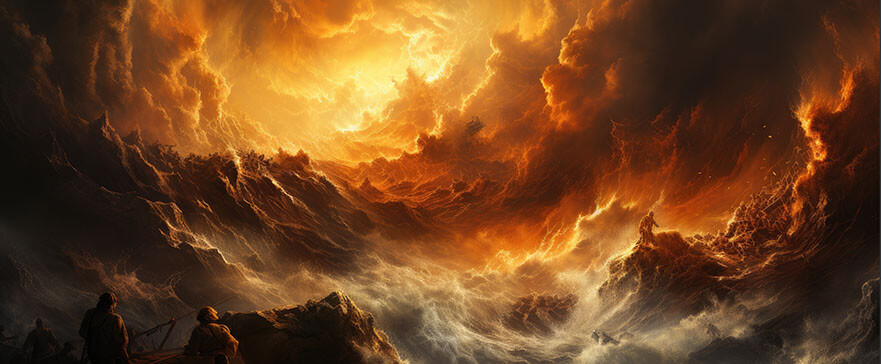For generations, people have asked and pursued questions concerning the Great Tribulation described in Scripture. Many have asked, “Who will experience the Tribulation?” and, “Where will the church be?”
While tribulation in general has been part of mankind’s experience since the fall of man (Genesis 3), this article addresses the defined period we understand as the Tribulation. The actual definition of the word tribulation is from the Greek word thlipsis, whose root word means to crush, press, or squeeze.
This Tribulation is referred to as “the time of Jacob’s trouble” (Jeremiah 30:7); the “day of wrath” (Zephaniah 1:15), and the “time of trouble” (Daniel 12:1). In Matthew 24:21–22 Jesus said, “For then there will be great tribulation, such as has not been since the beginning of the world until this time, no, nor ever shall be. And unless those days were shortened, no flesh would be saved.” In Revelation 6–18, John wrote of this time period as a time of unparalleled suffering, distress, and affliction on mankind.
Wrath and Repentance
What would be the purpose of this eventful time period? First and foremost, God’s purpose is to bring Israel to repentance. Gabriel, the angelic messenger to Daniel, said “Seventy weeks are determined for your people [Israel] and for your holy city.” The prophetic vision that Gabriel shared focused on the Jewish people (Daniel 9:24). We understand the 70 weeks as 490 years of specific prophetic events.
As the vision unfolded, Gabriel referred to the 70th week during which a man (Antichrist) will make a covenant regarding Israel, which is soon broken: “On the wing of abominations shall be one who makes desolate” (v. 27). In Matthew 24:15 Jesus referred to Daniel’s prophecy in regard to the abomination of desolation. In Matthew 24–25 Jesus addressed Israel, preparing them for the seven-year period when God’s wrath will be poured out on the earth.
This 70th week of Daniel will come to a conclusion when the Lord Jesus Christ returns in power and glory. Matthew 24:29–30 states, “Immediately after the tribulation of those days… they will see the Son of Man coming on the clouds of heaven with power and great glory.” The prophet Zechariah also described this specific time, writing, “Behold, the day of the Lᴏʀᴅ is coming…. For I will gather all the nations to battle against Jerusalem…. Then the Lᴏʀᴅ will go forth and fight against those nations…. And in that day His feet will stand on the Mount of Olives” (Zechariah 14:1–4).
Israel’s salvation as a nation is the outcome of the Lord’s glorious return!
What else takes place when the Lord returns? Zechariah answered, “And I will pour on the house of David and on the inhabitants of Jerusalem the Spirit of grace and supplication; then they will look on Me whom they pierced. Yes, they will mourn for Him as one mourns for his only son, and grieve for Him as one grieves for a firstborn” (12:10).
Israel’s salvation as a nation is the outcome of the Lord’s glorious return!
Upon Jesus’ return to the earth to save Israel, He will defeat the enemies of the Jewish people and then establish His Millennial Kingdom, bringing an end to the times of the Gentiles as prophesied by Jesus in Luke 21:24. In summary, we can conclude that the purposes of the Tribulation are (1) to bring Israel to repentance, (2) to bring God’s judgment on rebellious mankind, and (3) to bring an end to the time of the Gentiles.
The Church Removed
But what of the church? Will the church experience this time of Tribulation?
If the Tribulation’s main purpose is to bring Israel to repentance and to pour out God’s wrath on rebellious mankind, we can conclude there is no purpose for the presence of the church, or the body of Christ. We have several reasons to be confident of this view:
1. While the church is mentioned in Revelation 2–3, there is no mention of the church in chapters 6–18, which describe the events of the Tribulation.
2. The body of Christ is made up of those who have placed their faith in Christ alone for salvation and His completed work on the cross. Christ bore the cup of God’s wrath for the sins of mankind, and at the moment of salvation we are saved from God’s wrath (3:10). Believers “wait for His Son from heaven, whom He raised from the dead, even Jesus who delivers us from the wrath to come” (1 Thessalonians 1:10).
3. The Rapture of the church—when believers who are alive at the Lord’s return for His betrothed bride (John 14:1–3; 1 Thessalonians 4:13–18) are “caught up” to meet the Lord in the air—is a future event that brings an end to the Church Age and sets the stage for “the time of Jacob’s trouble,” the Tribulation.
Finally, we must ask, “Will anyone come to salvation during the Tribulation?” We can conclude that people will be saved during this time because:
In God’s grace and mercy, He has not left the distressed world without such a witness.
1. God provides this world with witnesses: Revelation 14:1–5 describes the presence of 144,000 who are “redeemed from among men” (v. 4). In God’s grace and mercy, He has not left the distressed world without such a witness.
2. Revelation 7 describes Tribulation saints as those “who came out of the great tribulation, and washed their robes and made them white in the blood of the Lamb” (v. 14).
While believers will not experience this horrific time period, we need to remember that after the Rapture, God is going to pour His judgment out on this world. Beyond following the Great Commission (Matthew 28:19–20), surely our hearts should be moved with compassion to share the Good News of the gospel with those who will otherwise face the certainty of God’s judgment.




